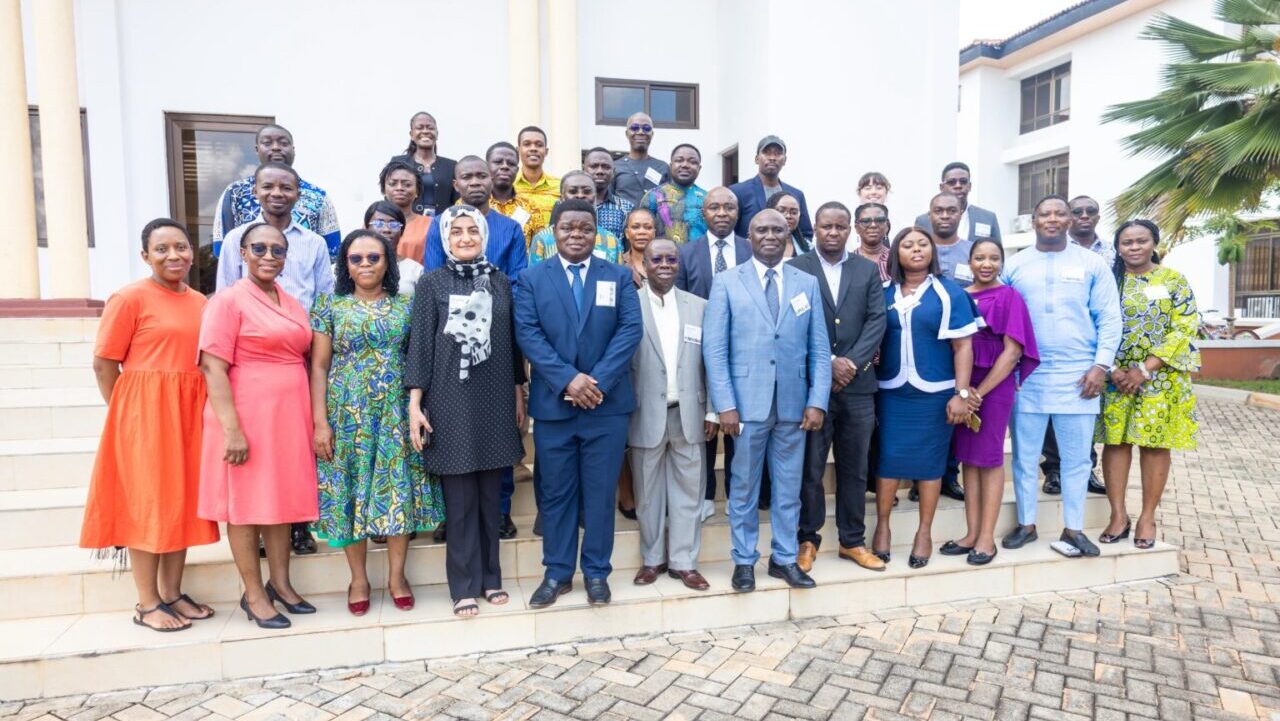Last week, Data for Policy CIC held its second strategic consultation as part of its Sub-Saharan Africa engagement project in Accra, Ghana, with co-hosts the Institute of Statistical, Social and Economic Research (ISSER) at the University of Ghana.
The two-day event, entitled ‘Advancing Data and AI Competency for Effective and Trustworthy Decision Making in Sub-Saharan Africa’ was a meeting of 30 thought leaders from West African academia, research, policy, and industry, made possible through funding and operational support from the Bill & Melinda Gates Foundation.
The event featured panel-led discussions of key objectives around five themes:
- NAVIGATING COMPLEXITY: DATA, AI & ADVANCED COMPUTATION IN DECISION-MAKING: focusing on existing AI initiatives & projects; challenges with AI adoption; opportunities with AI adoption; competence, ethics & trust worthiness; strategies for capacity building & long-term sustainability.
- FOSTERING A VIBRANT GOV-TECH INDUSTRY: considering current scope and application of gov-tech; collaborative models that encourage innovation and trust; data collection, privacy and security; practices on infrastructure readiness; opportunities for partnerships and scale-up.
- GOV-TECH & ENABLING COUNTRY SYSTEMS: discussing agri-tech systems and their role in responsive governance; opportunities and challenges when implementing gov-tech systems; scaling up; role for international partner contribution; frameworks for future collaboration.
- EVALUATING THE IMPACT OF WEST AFRICAN-LED RESEARCH AT THE NEXUS OF DATA & POLICY: debating what makes some research issues in Africa more significant than others; applying AI to data science and policy; best impact measurement methods in data science to aid policy; solutions for growth & collaboration.
- CONVERGENCE OF TECHNOLOGY & GRASSROOT ENGAGEMENT: examining role of technology in enhancing public services; limitations on the ability of grassroots to participate; risks in the use of technology for grassroots; balancing uniformity and contextual variability.
The lively panel discussions provided the back-drop for the final part of the meeting, where the participants formed breakout groups to discuss how Data for Policy could engage with the region to add value for all parties.
Data for Policy would like to extend its thanks to co-host institution ISSER and in particular its Director, Prof Peter Quartey and his colleagues
List of Speakers and Chairs
- Peter Quartey, Institute of Statistical Social & Economic Research
- Zeynep Engin, Data for Policy CIC
- Abena Nyamesem, Ghana Investment Funds for Electronic Communications
- Ahmed Dooguy Kora, L’Ecole Supérieure Multinationale des Télécommunications
- Amon Bazongo, Intelliances
- Camillus Abawiera Wongnaa, Kwame Nkrumah University of Science and Technology
- Charlie Martial Ngounou, AfroLeadership
- David S. Ameyaw, International Center for Evaluation and Development
- Diasmer Panna Bloe , Data for Policy CIC
- Elikplimi Komla Agbloyor, University of Ghana Business School
- Forster Boateng, Tree Crops Development Authority
- Hamdiyah Alhassan, University for Development Studies
- Henry Nunoo-Mensah, Kwame Nkrumah University of Science and Technology
- Jemima Adjanor, SolarTaxi
- Joshua Amo Adjei, University of Cape Coast
- Michael Kodom, University of Ghana
- Olubunmi Ajala, The Federal Ministry of Communications, Innovations, Nigeria
- Peter Olugbenga Adeleye, Institution of Data Scientists and Analysts
- Racine Ly (Virtual), Akademiya 20673
- Ridwan Sorunke (Virtual), Dev-Afrique
- Rislan Abdulazeez Kanya, Baze University Abuja
- Roselyn Adadzewa Otoo, Institute of Statistical Social & Economic Research
- S Martial Anicet Kiemde (Virtual), Le ministère de la Cybersécurité et du Numérique du Québec
- Samuel Benin, International Food Policy Research Institute
- Samuel Kobina Annim, Ghana Statistical Service
- Stanley Wood (Virtual), Bill & Melinda Gates Foundation
- Temitope Odedeyi (Virtual), University College London

